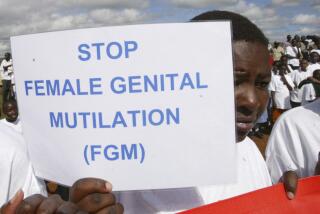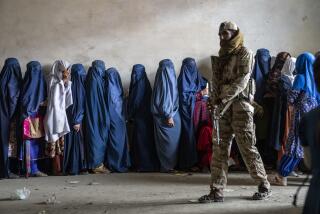Virginity tests, still performed after sexual assaults, should end: WHO
- Share via
The “two finger” test by which so-called healthcare providers around the world still perform “virginity tests” is degrading, has “no scientific validity” and should be treated as a violation of a woman’s human rights, says a newly issued World Health Organization handbook on healthcare for women subjected to sexual violence.
The latest denunciation of a practice still used throughout North Africa, the Middle East and South Asia prompted the independent group Human Rights Watch this week to call on the governments of those countries to put a stop to the practice.
Human Rights Watch has documented virginity testing in Afghanistan, where authorities use it to investigate “moral crimes” such as “zina” (consensual sex outside of marriage) and running away. Women accused of such crimes are often fleeing violence in the home, including forced marriage, Human Rights Watch said. Moreover, the tests are often inflicted upon some women several times -- and practiced on women charged with robbery or assault -- because of mistakes or bureaucratic policies.
In Afghanistan, authorities claim that such tests can detect whether consensual sex outside of marriage has occurred. Reported to judges, the results of these invasive “tests” are thought to carry great weight there, and often lead to convictions.
The use of such tests in court cases has also been documented in Libya, Jordan and Egypt, Human Rights Watch said. During Egypt’s 2011 “Arab Spring” uprising, several arrested female protesters charged that a military doctor performed “virginity testing” on them. An Egyptian administrative court ruled that conducting such tests on detained women is “an illegal act and a violation of women’s rights and an assault on their dignity.” But the only military officer charged in the virginity test trial was acquitted.
Human Rights Watch notes that in Indonesia, proposals to institute “virginity testing” for Indonesian schoolgirls are routinely raised. And, despite objections from senior female officers, such tests are used to screen female candidates for the national police force.
The subject arises in a handbook, “Health care for women subjected to intimate partner violence or sexual violence,” issued by WHO in November. Health workers should never use “virginity tests,” the handbook warns. Any physical exam following charges of assault should be conducted only with informed consent and should focus on determining the nature of medical care required, it adds. It concludes that the tests widely used to “prove” whether a woman or girl is a virgin have “no scientific validity.”
“Prejudice and negative stereotypes against women and girls are passed off as medical science by many doctors who wrongly believe they can determine a woman’s virginity,” said Liesl Gerntholtz, Human Rights Watch’s director of women’s rights.
“Governments and doctors should abide by the WHO handbook to ensure that they conduct themselves ethically, respect women’s privacy and dignity, and take steps to educate their peers to end the scourge of ‘virginity testing.’”
Follow me on Twitter @LATMelissaHealy and “like” Los Angeles Times Science & Health on Facebook.







